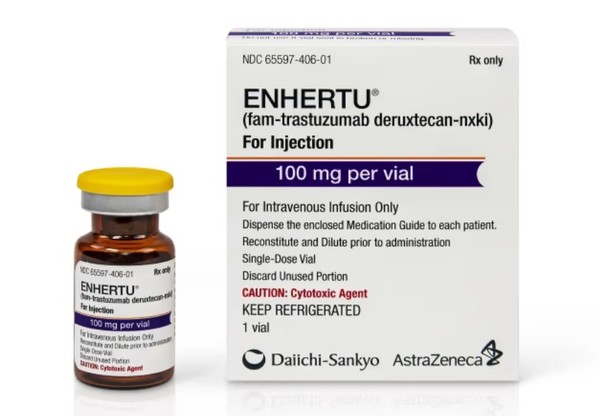“I’m a father of a loving daughter in her 20s. I’m going through painful days because my daughter has been receiving gruesome chemotherapy for over a year after she was diagnosed with stage four breast cancer last year. Then, I heard the news that a new drug (Enhertu) with an excellent anticancer effect was developed. I looked for ways to use this drug. But I’m devastated because the drug has yet to obtain approval.”
The writings are part of the father's letter to the Minister of Food and Drug Safety. The father sent the letter to Korea Biomedical Review, too.
The letter demands the government’s quick approval for Enhertu, explaining the urgency to treat the daughter diagnosed with stage four breast cancer.
According to the letter, his daughter received treatments using three different chemotherapies and participated in clinical trials. However, due to the drug resistance, none of the treatments worked. In addition, the father said her cancer had spread to the liver, lungs, and bones.
The father said Enhertu was approved in more than 40 countries, including the U.S. and Japan, and offered good therapeutic benefits to end-stage breast cancer patients.
However, he said that Korea has yet to grant the permit for the drug, and Korean patients do not know when the regulator will approve the drug.
“Even if the treatment gets the license, patients will not be able to use it immediately. Sadly, breast cancer patients and their guardians have to wait with so much worry and stress,” he said.
Enhertu got so popular that Korean patients might not get it
Enhertu (ingredient: trastuzumab deruxtecan) is a next-generation antibody-drug conjugate (ADC) jointly developed by Daiichi Sankyo and AstraZeneca.
Last month, a phase 3 clinical study of Enhertu was presented at the American Society of Clinical Oncology (ASCO 2022). The results were so impressive that the researchers received a standing ovation from oncologists. According to the study, Enhertu reduced the risk of disease progression or death by a whopping 50 percent, compared with conventional chemotherapy, in HER2-low metastatic breast cancer.

In Korea, the Ministry of Food and Drug Safety is reviewing Enhertu.
In June last year, the MFDS gave Enhertu priority review status, but the regulatory has been dragging its feet.
“We requested the company to submit supplementary data for Enhertu review,” an official at the MFDS said. “The approval timing depends on when the company will submit data.”
The problem is that as Enhertu approval gets delayed, the company may find it more difficult to expand indications or supply the drug to Korean patients.
Daiichi Sankyo applied Enhertu’s indication as a “third or higher treatment for HER2-positive advanced breast cancer” based on phase 2 DESTINY-Breast01 trial results.
When the company applied for authorization last year, it could not derive the results of the phase 3 DESTINY-Breast03 trial, a confirmatory study.
In the U.S. and Europe, however, the company obtained Enhertu authorization based on the outcome of DESTINY-Breast03 as a second or higher-line treatment for HER2-positive advanced breast cancer.
Even if Enhertu gets approval for a third or higher treatment, it could take months before it expands the indication to a second or higher treatment.
In addition, the number of patients eligible for Enhertu recently spiked worldwide. This could decrease the drug supply to Korea, observers said.
The results of the DESTINY-Breast 04 study helped broaden the target of Enhertu from HER2-positive breast cancer, which accounts for 15 percent of breast cancer, to HER2-low breast cancer, accounting for nearly 70 percent of all breast cancer patients.
Accordingly, Enhertu supply could go first to large markets where expanded indications are approved, such as the U.S. and Europe. Unless the drugmaker increases production facilities, Enhertu supply could be in shortage in other countries, industry watchers said.
Daiichi Sankyo Korea said if Enhertu obtains marketing approval in Korea, the company will immediately push to broaden the indication to use it in the second-line therapy based on DESTINY-Breast 03 results.
“We are well aware that patients are very interested in Enhertu after seeing its effects and clinical study results through the media,” an official at Daiichi Sankyo Korea said. “We are doing our best to provide Enhertu for Korean patients quickly and raise treatment access, and we will continue our efforts.”

